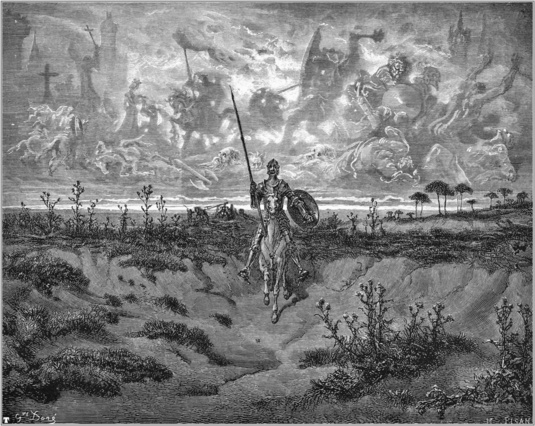Dialectics of Adventure in the Early Modern Period: Cervantes and Ariosto
Comparative Literature and Literary Theory, LMU Munich
Principal Investigator: Prof. Dr. Martin von Koppenfels
Postdoctoral researcher: Dr. des. Manuel Mühlbacher

Gustave Doré, illustration to Cervantes’ Don Quijote, 1863.
The project is predicated on a parallel reading of Ariosto’s Orlando furioso (1516/1532) and Cervantes’ Don Quijote (1605/15), taking important interpretive clues from the latter’s reading of the first. From this vantage point – as from the point of view of their long-term reception history – both works can be seen as crucial links in the textual chain that runs from medieval aventure to the modern novel. In both texts a reflection of earlier courtly adventure narratives takes place, destroying and at the same time transforming that type of narrative. This reflection operates mainly, but not exclusively in the mode of parody. In addition, both texts seem comparable in their basic diagnosis of a certain ‘decoupling’ of adventure from reality. To this state of affairs they react by splitting the narrative pattern: by entwining several different, indeed conflicting types of adventure. However, the contradictions between these types prepare the ground for narrative innovation: they generate new techniques of reflexive storytelling. Despite all the historical and poetic differences between Cervantine prose and Ariostan romanzo, this observation holds true for both texts; indeed it defines the key role they play in the process of transforming adventure into an entity of romance. By reading both works in a parallel arrangement we aim at establishing their respective positions in the genealogy of the modern novel, defining their respective narrative projects more precisely, as well as shedding new light on the contested issue of their intertextual relationship.

